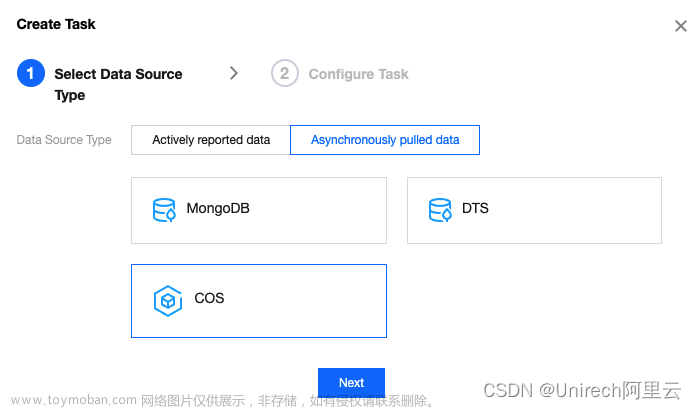1、导入相关依赖
<!--腾讯云COS-->
<dependency>
<groupId>com.tencentcloudapi</groupId>
<artifactId>tencentcloud-sdk-java</artifactId>
<version>3.0.1</version>
</dependency>
<dependency>
<groupId>com.qcloud</groupId>
<artifactId>cos_api</artifactId>
<version>5.6.8</version>
</dependency>2、编写配置类,获取配置信息
创建配置类主要需要以下信息
腾讯云账号秘钥和密码秘钥:用于创建COSClient链接对象,识别用户身份信息
存储桶区域:需要设置客户端所属区域Region
存储桶名称:创建请求时,需要告知上传到哪个存储桶下
存储桶访问路径:用于拼装上传文件完整访问路径
我获得的信息均写在配置类中,这里使用 @Value 或者 @ConfigurationProperties 都可以,写法就不多说,但是注意 @ConfigurationProperties 支持松散绑定,在识别读取配置信息时,不区分大小写,且会去掉中划线-、下划线_ (A-b_Obj→abobj→abObj),参考:SpringBoot松散绑定(宽松绑定)@ConfigurationProperties
import com.qcloud.cos.COSClient;
import com.qcloud.cos.ClientConfig;
import com.qcloud.cos.auth.BasicCOSCredentials;
import com.qcloud.cos.auth.COSCredentials;
import com.qcloud.cos.region.Region;
import lombok.Data;
import org.springframework.boot.context.properties.ConfigurationProperties;
import org.springframework.context.annotation.Bean;
import org.springframework.stereotype.Component;
/**
* @author phf
* @description @ConfigurationProperties 松散绑定(中划线-、下划线_ 都去掉,且不区分大小写)
*/
@Component
@ConfigurationProperties(prefix = "cos")
@Data
public class CosConfig {
/**
* 腾讯云账号秘钥
*/
private String secretId;
/**
* 密码秘钥
*/
private String secretKey;
/**
* 存储桶地区
*/
private String region;
/**
* 存储桶名称
*/
private String bucketName;
/**
* 存储桶访问路径
*/
private String path;
/**
* 初始化cos对象,配置相关配置信息
*/
@Bean
public COSClient cosClient(){
// 1 初始化用户身份信息(secretId, secretKey)。
COSCredentials cred = new BasicCOSCredentials(this.secretId, this.secretKey);
// 2 设置 bucket 的区域
Region region = new Region(this.region);
ClientConfig clientConfig = new ClientConfig(region);
// 3 生成 cos 客户端。
COSClient cosClient = new COSClient(cred, clientConfig);
return cosClient;
}
}
配置信息获取
(1)进入腾讯云对象存储→创建存储桶(有则跳过),获取存储桶名称、区域、存储桶访问路径
(2)获取腾讯云账号秘钥
3、编写逻辑层——实现上传
我这里用了多文件上传,单文件上传,把数组和循环去掉即可
public interface ICosFileService {
/**
* 上传
* @param files
* @return
*/
RestApiResponse<String> upload(MultipartFile[] files);
/**
* 删除
* @param fileName
* @return
*/
RestApiResponse<Void> delete(String fileName);
}
@Slf4j
@Service
public class ICosFileServiceImpl implements ICosFileService {
@Resource
private COSClient cosClient;
@Resource
private CosConfig cosConfig;
@Override
@Transactional(rollbackFor = Exception.class)
public RestApiResponse<String> upload(MultipartFile[] files) {
RestApiResponse<String> response = RestApiResponse.success();
String res = "";
try {
for (MultipartFile file : files) {
String originalFileName = file.getOriginalFilename();
// 获得文件流
InputStream inputStream = null;
inputStream = file.getInputStream();
// 设置文件路径
String filePath = getFilePath(originalFileName, "你的桶内文件路径abc/def/test/");
// 上传文件
String bucketName = cosConfig.getBucketName();
ObjectMetadata objectMetadata = new ObjectMetadata();
objectMetadata.setContentLength(file.getSize());
objectMetadata.setContentType(file.getContentType());
PutObjectRequest putObjectRequest = new PutObjectRequest(bucketName, filePath, inputStream, objectMetadata);
cosClient.putObject(putObjectRequest);
cosClient.setBucketAcl(bucketName, CannedAccessControlList.PublicRead);
String url = cosConfig.getPath() + "/" + filePath;
res += url + ",";
}
String paths = res.substring(0, res.length() - 1);
response.setData(paths);
return response;
} catch (IOException e) {
e.printStackTrace();
} finally {
cosClient.shutdown();
}
return RestApiResponse.fail();
}
@Override
public RestApiResponse<Void> delete(String fileName) {
cosConfig.cosClient();
// 文件桶内路径
String filePath = getDelFilePath(fileName, "你的桶内文件路径abc/def/test/");
cosClient.deleteObject(cosConfig.getBucketName(), filePath);
return RestApiResponse.success();
}
/**
* 生成文件路径
* @param originalFileName 原始文件名称
* @param folder 存储路径
* @return
*/
private String getFilePath(String originalFileName, String folder) {
// 获取后缀名
String fileType = originalFileName.substring(originalFileName.lastIndexOf("."));
// 以文件后缀来存储在存储桶中生成文件夹方便管理
String filePath = folder + "/";
// 去除文件后缀 替换所有特殊字符
String fileStr = StrUtil.removeSuffix(originalFileName, fileType).replaceAll("[^0-9a-zA-Z\\u4e00-\\u9fa5]", "_");
filePath += new DateTime().toString("yyyyMMddHHmmss") + "_" + fileStr + fileType;
log.info("filePath:" + filePath);
return filePath;
}
/**
* 生成文件路径
* @param originalFileName 原始文件名称
* @param folder 存储路径
* @return
*/
private String getDelFilePath(String originalFileName, String folder) {
// 获取后缀名
String fileType = originalFileName.substring(originalFileName.lastIndexOf("."));
// 以文件后缀来存储在存储桶中生成文件夹方便管理
String filePath = folder + "/";
// 去除文件后缀 替换所有特殊字符
String fileStr = StrUtil.removeSuffix(originalFileName, fileType).replaceAll("[^0-9a-zA-Z\\u4e00-\\u9fa5]", "_");
filePath += fileStr + fileType;
log.info("filePath:" + filePath);
return filePath;
}
}
4、编写Controller测试
@Api(tags = "cos文件操作")
@RestController
@RequestMapping("/cos")
public class ICosFileController {
@Autowired
private ICosFileService iCosFileService;
@ApiOperation(value = "文件上传", httpMethod = "POST")
@PostMapping("/upload")
public RestApiResponse<String> upload(@RequestParam("files") MultipartFile[] files) {
RestApiResponse<String> result = iCosFileService.upload(files);
return result;
}
@ApiOperation(value = "文件删除", httpMethod = "POST")
@PostMapping("/delete")
public RestApiResponse<String> delete(@RequestParam("fileName") String fileName) {
iCosFileService.delete(fileName);
return RestApiResponse.success();
}
}

上传成功,且返回完整信息


删除时,保证删除的文件名称参数key,为桶内文件完整路径即可,如果你的桶是app-bucket-name,文件含桶路径是app-bucket-name/file1/file2/file.png,那桶内完整路径就是file1/file2/file.png
public RestApiResponse<Void> delete(String fileName) {
cosConfig.cosClient();
// 文件桶内路径
String filePath = getDelFilePath(fileName, "你的桶内文件路径abc/def/test/");
// 这里的第二个参数,必须是桶内的完整路径
cosClient.deleteObject(cosConfig.getBucketName(), filePath);
return RestApiResponse.success();
}

5、问题:COSClient报错连接池已关闭
之前自主调用了cosClient.shutdown,结果第二次上传时,就抛出异常,其实它自己维护了一个线程池:对象存储 Java SDK 常见问题-SDK 文档-文档中心-腾讯云

文章来源:https://www.toymoban.com/news/detail-609428.html
6、完整代码
https://download.csdn.net/download/huofuman960209/88085303文章来源地址https://www.toymoban.com/news/detail-609428.html
到了这里,关于springboot快速整合腾讯云COS对象存储的文章就介绍完了。如果您还想了解更多内容,请在右上角搜索TOY模板网以前的文章或继续浏览下面的相关文章,希望大家以后多多支持TOY模板网!





![[php-cos]ThinkPHP项目集成腾讯云储存对象COS](https://imgs.yssmx.com/Uploads/2024/02/609420-1.png)





